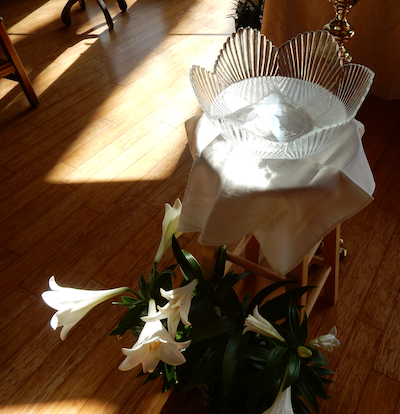"The Pool of God"
Jessica Powers wrote of Mary: “There was nothing in the Virgin’s soul that belonged to the Virgin—no word, no thought, no image, no intent/ She was a pure, transparent pool reflecting/ God, only God…God was her sky and she who mirrored Him/ became His firmament.”
Mary’s glory is often seen as a matter of glorious privileges…stupendous prenatal purity, sinlessness, divine election and all the rest. And perhaps all this is true.
But as Julian saw it, this purity was, at bottom, a matter of unflinching honesty, an absolute appreciation of and acceptance of her creatureliness and the greatness of God, the “wisdom and truth of her soul” that had an unobstructed view of reality—“the greatness of her maker and the littleness of her created self”—that caused her to say very humbly to Gabriel, “Behold me here, the handmaid of the Lord.” Julian adds that the reverent awe of this contemplation of God filled Mary with humility. Hence there was vast space for pondering these things in her heart, but no room for the words, thoughts, images, or intentions of an anxiety that would have sprung from a distorted estimation of herself.
On account of all this, Mary “is greater in worthiness and grace than everything which God created below her” and “was filled with grace and with every kind of virtue, and she surpasses all created beings.” And yet also on account of, not despite this, she is also a template of the holiness the disciples are called to, the exemplar, with Jesus, of that unflinching honesty that sees all things in proper perspective.
How to get there? We are, as Powers put it, “dry earth or stubborn sod.” We will avoid, by the most religious means and phrases, any real encounter with or admission of this absolute contingency and poverty of our being, the fundamental dependency on God that Jesus embodied and which both he and Julian presented in the image of a child. Safer far just to admire the Blessed Virgin and call it a day.
But Julian concludes that this admiration—which she found in herself as the desire to see Mary—is insufficient, and that she herself was taught to consider instead “the virtues of her blessed soul: her truth, her wisdom, her love, through which I may learn to know myself and reverently fear my God.” This knowledge of oneself and reverent fear of God is precisely what Julian saw in the Virgin’s soul. After Mary, it is the way of all the saints, to become—without ever noticing it oneself—“water that lost the semblances of water/ and was a sky like God.”
"The Pool of God" is the title of Jessica Power's poem quoted herein.

Recent Issues
January 2025
September 2024
May 2024
March 2024
February 2024
January 2024
December 2023
November 2023
October 2023
July 2023
May 2023
January 2023
December 2022
October 2022
September 2022
July 2022
May 2022
April 2022
March 2022
January 2022
December 2021
November 2021
October 2021
June 2021
May 2021
April 2021
February 2021
January 2021
December 2020
October 2020
September 2020
August 2020
July 2020
June 2020
May 2020
April 2020
March 2020
February 2020
January 2020
December 2019
November 2019
October 2019
September 2019
August 2019
July 2019
May 2019
April 2019
March 2019
January 2019
December 2018
November 2018
October 2018
September 2018
August 2018
July 2018
June 2018
May 2018
April 2018
March 2018
February 2018
January 2018
December 2017
November 2017
October 2017
September 2017
June 2017
May 2017
April 2017
March 2017
February 2017
January 2017
December 2016
November 2016
October 2016
September 2016
August 2016
July 2016
June 2016
May 2016
April 2016
March 2016
February 2016
January 2016
December 2015
November 2015
October 2015
September 2015
August 2015
July 2015
June 2015
May 2015

